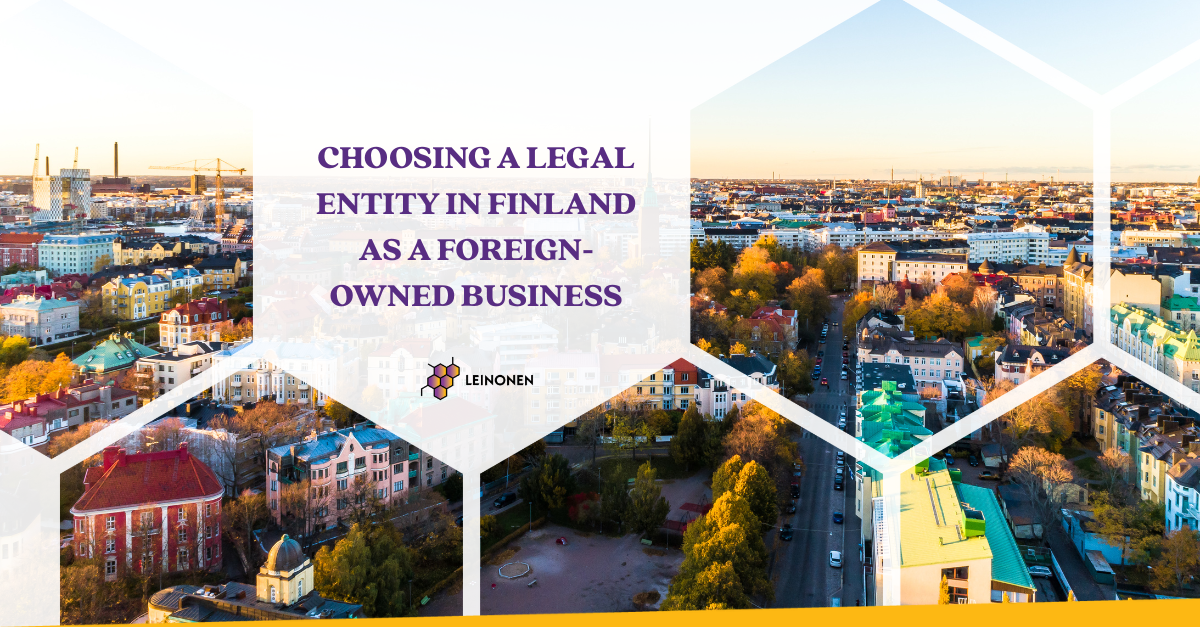Whether you want to limit your personal liability, maximise profits, or access specific benefits, choosing the right legal entity in Finland is the first step. Familiarising yourself with the country’s main business entities will allow you to make an informed decision for the future growth of your foreign-owned business in Finland.
In this article, Leinonen Finland will introduce the seven main legal entities you can opt for, covering everything from formation and governance requirements to compliance and tax considerations.
Legal Entities in Finland
There are Seven Main Business Entities in Finland:
- Private Limited Company (Osakeyhtiö – Oy)
- Public Limited Company (Julkinen osakeyhtiö – Oyj)
- Branch of a Foreign Company
- Sole Trader (Toiminimi)
- Limited Partnership (Kommandiittiyhtiö – Ky)
- General Partnership (Avoin yhtiö – Ay)
- Cooperatives and Foundations
What is the Most Popular Business Entity in Finland?
Oy is the most popular legal entity in Finland. Offering benefits like limited liability, it is a flexible option suitable for small and large businesses alike. Oy is often a great choice for those looking to attract investors and scale a business.
When Might Branch or Sole Proprietorship be Favoured?
Branches are often favoured by foreign companies that want a local presence without forming a separate legal entity, and sole traders can be simpler for small scale, individual businesses and entrepreneurs.
Formation Requirements
What are the key Steps Involved in Forming a Legal Entity in Finland?
- Oy and Oyj must register with the Trade Register; the company only exists after this. Registration requires articles of association and founding documents to be provided. For Oyj, payment of share capital is also required.
- Branches must also register with the Trade Register, providing documentation from the home country and appointing a local representative.
- Registration is not a requirement for sole traders; the business starts upon notification.
- A Ky or Ay is formed by an oral or written partnership agreement. Registration is not constitutive, but is required for public record.
How Long Does it Take?
Typically, registering a business entity in Finland takes three to four weeks.
How Much Does it Cost?
This depends on the type of legal entity and whether expedited processing is used. For example, statutory fees to register an Oy typically range from €270 to €380. If specialists are used, the total expense can be around €1,500 to €2,000.
Capital and Ownership
Do any Legal Entities in Finland Require a Minimum Share Capital?
To form an Oyj, a minimum share capital of €80,000 is needed. None of the other main business entities in Finland have minimum share capital requirements.
Do any Business Entities in Finland Have Restrictions on Foreign Ownership or Directors?
At least one Oy board member must be a European Economic Area (EEA) resident. If not, an additional fee must be paid to apply for a permit from the Business Register (PRH). There are no broad restrictions on foreign ownership for any of the main legal entities in Finland.
How Many Shareholders or Partners are Required for Each Business Entity?
| Legal Entity | Shareholders | Partners |
|---|---|---|
| Oy | 1+ | n/a |
| Oyj | 1+ | n/a |
| Ay | n/a | 2+ |
| Ky | n/a | 1+ general partner and 1+ limited partner |
| Sole Trader | n/a (one individual) | n/a (one individual) |
Taxation
Corporate Income tax
All companies are subject to 20% corporate income tax on profits. For sole traders and partnerships, income is subject to personal taxation.
VAT Registration
If turnover exceeds the €20,000 threshold, Value Added Tax (VAT) registration is required. The general rate of VAT in Finland is 25.5%.
VAT in the Digital Age (ViDA)
ViDA came into force in March 2025, and will be gradually rolled out until January 2035. This new package will have an effect on practices surrounding VAT in Finland – find out more in this article by the European Commission.
Profit Distribution Taxation
Dividends Received by Individuals
When a dividend is received from a listed company, 85% of the dividend is taxable capital income, and 15% is tax exempt. Capital income tax rates are 30%, or 34% for the portion exceeding €30,000 annually.
Taxation of dividends from unlisted companies depends on the amount relative to the company’s net assets. For dividends up to 8% of net assets and up to €150,000, 25% is taxable as capital income and 75% is tax exempt. Exceeding €150,000, 85% is taxable as earned income, and 15% is tax exempt. For dividends over 8% of net assets, 75% is taxable as earned income, and 25% is tax exempt.
Dividends Received by Entities
Dividends received from domestic companies are generally tax exempt, with exceptions including when the payer is an unlisted company but the recipient is a listed company. In this case, the dividend is fully taxable.
Are Dividend Payers Taxed?
Companies do not generally pay tax on distributed dividends, but must withhold tax on the dividend and report distributed dividends to the tax authority. Dividends received from abroad are generally taxed similarly to domestic dividends, but any withholding tax may be credited against Finnish taxes.
Accounting and Reporting
Accounting Standards
The Finish Accounting Act and Finnish Accounting Standards (FAS) apply. Public listed companies must also keep accounts in line with International Financial Reporting Standards (IFRS).
Statutory Audit Requirements
A legal entity in Finland must appoint an auditor and conduct an audit unless otherwise stipulated by law. An auditor may only be omitted if in both the most recent and the previous financial year, no more than one of the following conditions were met:
- The balance sheet total exceeds €100,000
- The turnover or corresponding revenue exceeds €200,000
- The average number of employees exceeds three
Deadlines and Procedures
Typically, annual financial statements and tax returns must be filed no more than four months after the end of the financial year.
Legal and Operational Aspects
Permitted Business Activities
All legal entities in Finland can engage in most business activities, unless restricted by law or articles of association.
Employment
Branches and sole traders can employ staff in Finland.
Liability of Business Entities in Finland
- In an Oy or Oyj, liability is limited to company assets
- Ay partners have unlimited liability
- Ky general partners have unlimited liability, but the liability of limited partners is restricted to their investment
- Sole traders have unlimited personal liability
Compliance and Governance
All legal entities in Finland have a number of ongoing compliance and governance requirements. We will focus on two of the most common entities, Oy and Oyj, but full guidelines for other entities can be found by consulting with a Finnish accounting and tax expert.
Governance Requirements
| Legal Entity | Board Members | Deputy Members |
|---|---|---|
| Oy | 1+ regular member | At least 1 must be appointed if only 1 regular board member |
| Oyj | 3+ members | Not mandatory, but may be appointed |
What Conditions do Board Members Need to Meet?
For both Oy and Oyj, board members must be of legal age and not bankrupt. They must not have restricted legal capacity. At least one board member (and one deputy member for Oy) must reside within the EEA, unless an exemption is given by the Finnish Patent and Registration Office.
As per the Equality Act, companies majority owned by the state or municipalities and bodies exercising public authority must have at least 40% representation of both men and women (unless specific reasons justify otherwise).
For Oyj, board members must also possess sufficient expertise and experience in the company’s industry and risks. Diversity of the board’s composition and gender balance must also be promoted, with written policies on these matters in place.
Ongoing Obligations for Oy and Oyj: Summary Table
| Obligation | Oy | Oyj | Deadline |
|---|---|---|---|
| Annual General Meeting (AGM) | Yes | Yes | Must be within 6 months of financial year end, and financial statements and related documents must be made available to shareholders at least a week prior |
| File financial statements | Yes | Yes | Within 2 months after AGM |
| Tax return | Yes | Yes | Annually |
| Notify Register changes | Yes | Yes | As needed |
| Statutory audit | If required | Yes | Auditor’s report must be delivered to the board at least 2 weeks before AGM |
| Listed company disclosures | n/a | Yes | Ongoing, as per law |
Choose the Right Legal Entity With Leinonen Finland
Leinonen Finland has specialised in supporting cross-border businesses in Europe for more than 34 years. With unparalleled local knowledge, our Finnish accounting, tax, and payroll experts can offer tailored advice for foreign-owned businesses in Finland.
Choosing the right legal entity for your foreign-owned business in Finland is crucial. Consult with Leinonen Finland for the expert guidance your company deserves.





